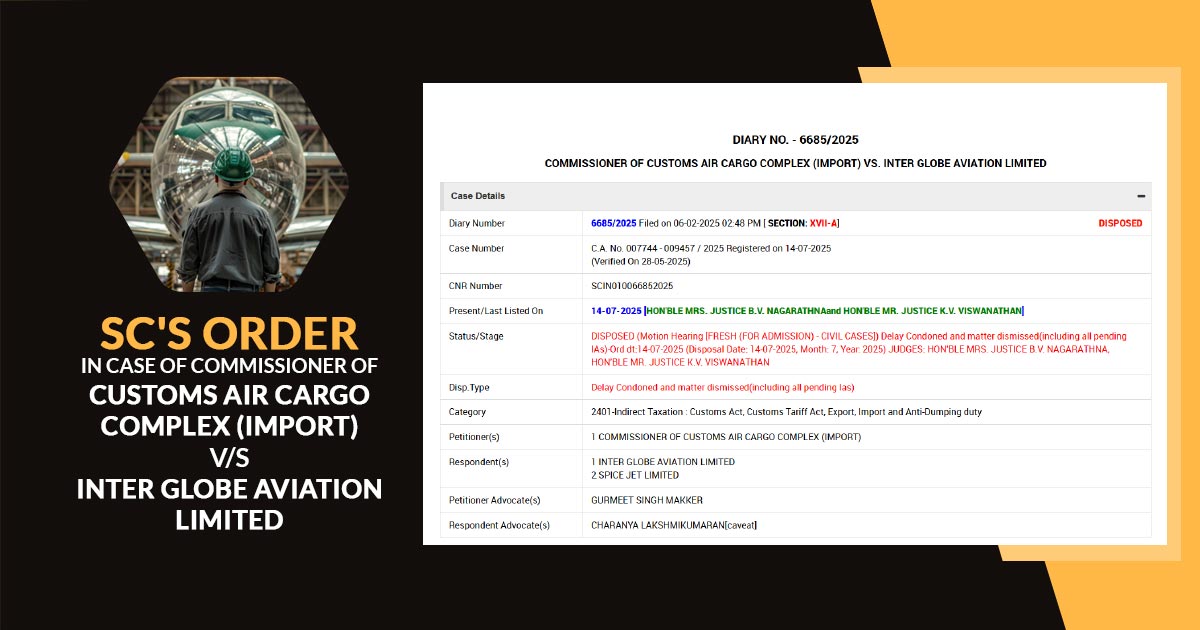
The Supreme Court, in a relief to Indian airlines such as IndiGo and SpiceJet, dismissed an appeal by the Customs Department seeking to levy Integrated Goods and Services Tax (IGST) on re-imported aircraft and spare parts that had been sent abroad for repairs. The tax demand was based on a 2021 notification attempting to retrospectively amend a 2017 exemption order.
The appeal filed by the customs authorities has been refused by the bench of Justices B.V. Nagarathna and K.V. Viswanathan, which contests an August 2024 decision of the Customs, Excise and Service Tax Appellate Tribunal (CESTAT), which struck down the retrospective tax demand. Retroactively charging IGST shall burden the aviation sector, CESTAT held.
The legal dispute traces back to the enactment of the Goods and Services Tax (GST) regime in July 2017. On June 30, 2017, Notification No. 45/2017-Customs was issued, exempting re-imported aircraft parts from IGST, confining the applicable tax to basic customs duty (BCD) on the cost of repairs, freight, and insurance. The same structure shall be followed by the airlines, assuming that the IGST was inapplicable.
Thereafter, the customs officials claimed that under the GST structure, the term duty of customs comprises IGST and started raising tax demands from August 2017. Various airlines contested these demands before the tribunal.
CESTAT in November 2020 held in favour of the airlines, citing that IGST was not covered under the 2017 notification since it was not explicitly mentioned. The same decision has been appealed by the government before the Apex court, which considered the appeal, and that case is pending to this day.
The government, on July 19, 2021 has issued Notification No. 36/2021-Customs, revising the 2017 notification to comprise IGST and compensation cess on re-imported goods. The amendment mentioned to only cite the original objective of the law, and customs authorities then tried to apply the IGST demand retroactively from July 1, 2017, to July 18, 2021.
Read Also: GST Impact on Indian Aviation Sector (Latest Update)
The same move was again contested via the airlines. CESTAT on August 5, 2024, ruled that the retrospective levying of IGST was not legally tenable and quashed the tax demands. The appeal of the customs department against the same ruling would be directed to the decision of the Apex court.
Additional Solicitor General N. Venkataraman in the hearing urged the court to acknowledge the appeal, claiming that only Rs 100 crore in revenue was at stake and that the interpretation of the 2017 notification remained a live problem before the Supreme Court. He argued that even if the 2021 notification was not valid for its retrospective nature, Integrated Goods and Services Tax (IGST) can still be imposed under the original 2017 norms.
Though the bench was not persuaded. “You can’t do it by a retrospective amendment. If the 2017 notification did not include IGST, the 2021 clarification cannot be used to enforce it retrospectively,” the court stated before dismissing the appeal.
The case comprises nearly 1,800 bills of entry import declarations made for aircraft and parts re-imported after overseas repairs. As of July 2024, on all imports of aircraft components and MRO (maintenance, repair, and overhaul) items, India applies a uniform 5% IGST specified under policy efforts to help the aviation sector.
On March 4, 2025, the Delhi High Court, in a development, notified the unconstitutional parts of the 2021 notification that asked to levy the IGST and cess on repair costs of re-imported goods. Till now, the government has not contested the ruling before the Apex court.








